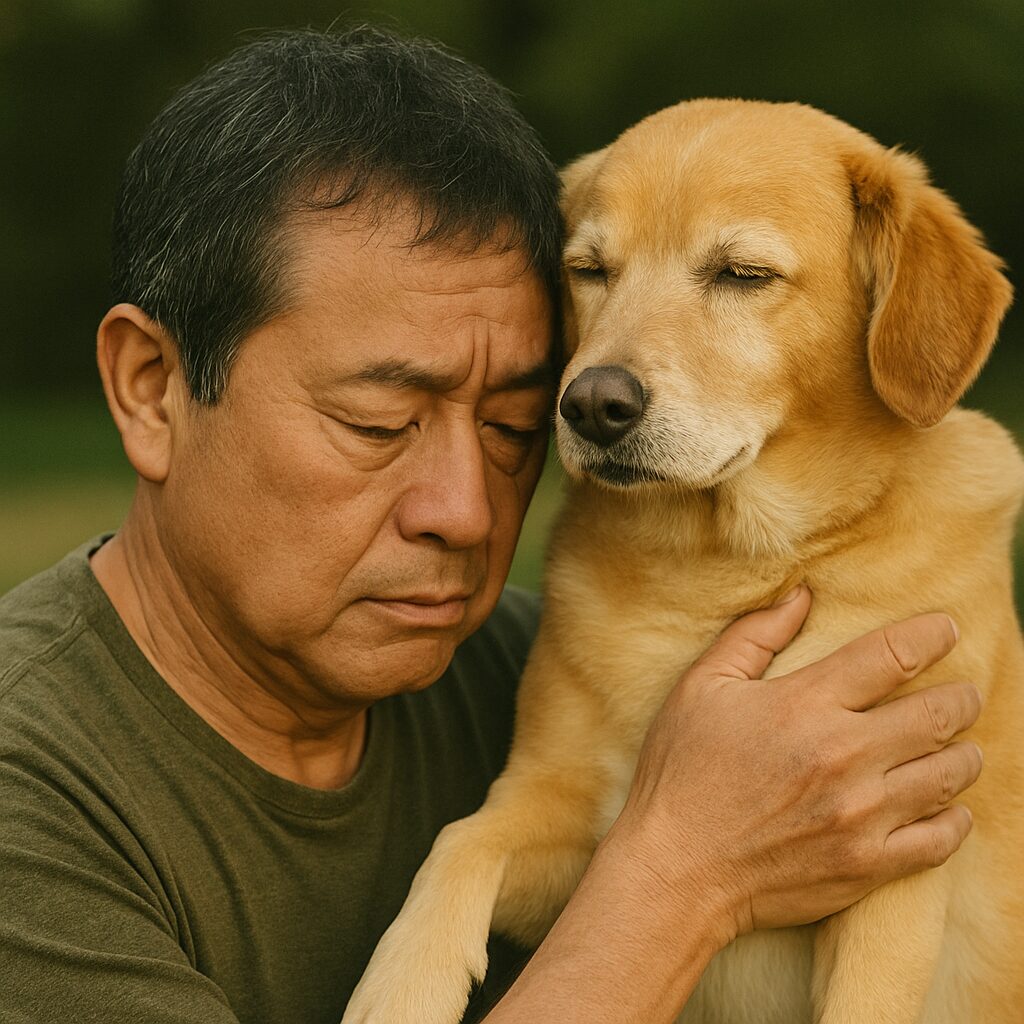Michael never thought his life would narrow into hospital rooms, medication schedules, and the heavy silence of waiting. He was in his late fifties, living in Canada, when doctors delivered the kind of news that drops like a stone into the soul: terminal cancer. The prognosis was blunt and merciless. Two to three years, perhaps, if the treatments slowed the advance. Michael left that appointment feeling as though time itself had been stolen.
At first, he tried to hold on to his normal routines. He still made coffee in the mornings, still tried to take short walks around his neighborhood, still reached for small comforts. But illness has a way of creeping into every corner of daily life. Days in bed grew longer. Side effects from treatments hollowed out his energy. Evenings once spent watching television with a warm blanket became battles with nausea and fatigue. What had once been an ordinary life began to dissolve.
And then there was Minnie.
Minnie was not just a dog. She was the small, steady heartbeat in Michael’s home. Years earlier, Michael had rescued her when she was just a frightened pup in need of care. The bond they built was immediate and deep. She became his shadow, padding along behind him, curling beside his legs, watching his every move as though she drew her own sense of safety from him.
When cancer entered Michael’s life, Minnie’s role transformed. She was no longer just his companion—she was his witness. On mornings when he couldn’t get out of bed, Minnie lay pressed against his side, warm and unwavering. When despair made conversation impossible, her eyes spoke volumes. In a world that felt stripped of hope, she was the last light he could still see.
Yet, as the months passed and treatments grew more punishing, Michael faced a wrenching decision. He feared that when his time came, Minnie would be left alone, confused, and abandoned. With an ache that words cannot capture, he entrusted her to an animal protection organization. It was an act of love cloaked in sorrow. He wanted her safe. He wanted someone to promise her the future he no longer believed he could give.
That separation nearly broke him. The house, once filled with the small rhythms of her paws and her gentle breathing, fell silent. He tried to convince himself that this was the responsible thing, the right thing. But the absence of Minnie hollowed out his days in ways illness alone never could. It was as if by surrendering her, he had surrendered his last tether to life itself.
Then something unexpected happened.
Michael’s story, and Minnie’s, made its way into a television program in Japan that highlighted the profound relationships between people and their pets. Viewers watched as cameras captured Michael’s vulnerability, his heartbreak, and the quiet, steadfast presence of the dog he had once rescued. They saw Minnie’s patience, her unspoken loyalty, her quiet waiting even while in the shelter. And then they witnessed something unforgettable: their reunion.
When Minnie saw Michael again, it was as if no time had passed. She bounded to him with a mix of relief and joy, her tail wagging furiously, her eyes shining with recognition. Michael, weakened though he was, opened his arms and gathered her close. Tears streamed down his face, but they weren’t only of sorrow. In that moment, something flickered back to life within him.
The cameras caught what words cannot fully explain: the way Minnie nestled against him, the way Michael’s shoulders lifted as though a weight had been set down. For those watching, it was more than just a man and his dog. It was a story about love that refuses to die, about hope reigniting in the least expected of ways.
That reunion changed everything. Michael, who had all but given up on treatment, found himself rethinking. If Minnie could wait for him, if she could still believe in him, then perhaps he could still believe in himself. He resumed therapies he had once resisted, this time with a renewed will to fight. Doctors noted the difference—not just in his physical response, but in his spirit.
It wasn’t a miracle cure. Cancer remained his companion, shadowing his body with limitations. But what Minnie gave him was something medicine could not: a reason. He began to see his days not only as a countdown but as moments still worth living. He wanted to walk her again, to feel the tug of the leash in his hand. He wanted to sit with her on the porch, to feel the sun warm their faces together.
Viewers across Japan were moved. Letters poured in to the network. People wrote about their own pets, about how a dog or a cat had carried them through grief, loneliness, or illness. Some said they had been inspired to adopt shelter animals themselves, seeing in Minnie the living proof of the transformative power of companionship. Others admitted that they had underestimated the role animals play in healing hearts.
Michael’s story was no longer just his. It became a shared testament to the quiet, extraordinary ways animals save us.
What makes it so powerful is that Minnie did not perform a dramatic act. She did not cure a disease or alter the course of science. Her gift was simpler and more profound. She stayed. She offered her presence, her warmth, her loyalty. She was the reminder that life, even in its most fragile form, is still worth holding.
There is a saying often repeated: dogs may only be a part of our lives, but to them, we are their whole world. For Michael, Minnie’s devotion was a mirror reflecting back a truth he had nearly forgotten. Even when the body weakens, the soul can still be nourished. Even when the future seems uncertain, love can anchor us to the present.
Looking back, Michael spoke of Minnie not as his pet, but as his savior. He credited her with pulling him out of despair, with giving him the courage to keep fighting. And in return, he gave her what she had always wanted: not grand gestures or riches, but simply his presence.
Their story reminds us that the greatest medicine is not always found in pills or hospital wards. Sometimes it comes on four legs, with soft eyes and an unshakable devotion. It comes in the way a dog leans into you when you feel like collapsing, or the way she waits by the door no matter how long you’ve been gone.
Minnie did not cure Michael’s cancer. But she helped him live again, not just survive. That distinction matters.
For anyone who has ever loved an animal, this truth feels both familiar and astonishing. Our companions cannot speak our language, but they understand us in ways deeper than words. They ask for little and give endlessly. And in moments when we are most fragile, they can become the bridge that carries us back to ourselves.
Michael and Minnie’s journey is a story about more than illness and survival. It is about the human need for connection, about how love can take root in unexpected places and change the course of a life. It challenges us to reconsider what healing truly means. Perhaps it is not only about eradicating disease, but also about rediscovering joy, purpose, and the courage to keep moving forward.
For Michael, that rediscovery came in the form of a wagging tail and a pair of trusting eyes. And for those who watched from afar, their story became a reminder that hope can be reawakened in the simplest of ways.
Minnie gave Michael a reason to believe again. And in doing so, she gave the rest of us a story we cannot forget.

